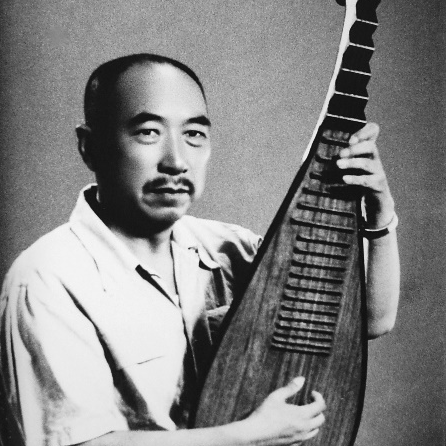Cheng Wujia

Cheng Wujia is a pipa player. Born in Fengxian, Shanghai in 1902. He studied Jiangnan Sizhu with his father since he was a child. In middle school, he learned all the repertoires of the Chongming school pipa "Yingzhou Ancient Tunes", and learned Guqin from Wang Yanqing in Zhucheng, Shandong. Followed by Zheng Kun Literature Guqin, Gu Se, Kong Hou, followed by Wang Xianting to learn pipa.
Cheng Wujia is committed to the development of the national music industry, and has successively served in the Jian German Orchestra, the Wanguo Art Institute, and the Shanghai National Music Institute. After liberation, he mainly engaged in music education, and has been teaching at Nanjing University of the Arts since then.
Cheng Wujia played the traditional pipa music, and tried not to modify it, so as to better preserve the original appearance of the music, such as "The Overlord Removing the Armor", "Autumn Moon in the Han Palace", "White Snow in the Spring", "Flying Flowers and Green", etc., all of which have a simple style. , and changed the pipa from the original four roots and twelve frets to the twelve equal temperaments, which made a certain contribution to the reform and development of national musical instruments.
His works include more than ten pipa solo pieces, and also compiled books such as "Pipa Music Score" and "Shiban Gong and Drum".
He studied at Yangzheng Elementary School and County Higher Primary School for 7 years and was admitted to Nanjing Middle School. During his studies, he learned Guqin from Wang Yanqing, a teacher at Nanjing Higher Normal University, and Pipa from Chongming Shen Zhaozhou. After graduating from middle school, he was sponsored by Chinese music lovers and teachers Chen Tonglun and Wu Zhikun in the town, and was promoted to Fudan University to study liberal arts and social education. In his spare time, he is engaged in the collection, arrangement, compilation and performance of folk music, and serves as the Minister of Literature and Art of the Student Union and the President of the National Music Society. At that time, under the guidance of Zhang Shizhao, Miao Yuntai and Zheng Jingwen, he participated in the creation of Shanghai "Datong Music Club". Later, he went to Shanghai North Railway Station Jiande Association to be the director of Jiande Orchestra.
In the 17th year of the Republic of China, after graduating from Fudan University, he went to Beijing to participate in the activities of "Wanguo Art Institute" under the guidance of Professor Zhao Yuanren and Jin Shuchu of Peking University, and served as a Chinese music teacher. During this period, he learned guzheng from Wei Ziyou in Henan, "Seven Gongs and Drums" from Zhao Ziheng in Yunnan and Sun Jieqing in Beijing, and Hunan music from Zhang Weiyu in Hunan. In the 1940s, he performed Chinese music in Kunming and Chongqing through the Field Service Club of Inspirational Club, and composed pipa pieces such as "Watching the Sunrise on Mount Tai" and "Night Rain on Bashan". After the victory of the Anti-Japanese War, he was recommended by Gu Yu, Wu Bochao, Yang Yinliu and others as a professor of Chinese music at the National Chengchi University and the National Conservatory of Music.
After liberation, he successively served as a professor of Chinese music in the Department of Literature and Art of East China Military and Political University, the Department of Literature and Art of Shandong University, East China Academy of Arts and Nanjing Academy of Arts, and actively created "Long Live Freedom", "Land Boat", "Victorious Crossing the East Sea" and "Pukou Pier" "Military-Civil River Dance", "Brave Warrior", "Beautiful Youth", "Peacock Opening Screen", "Steel Flower", "Autumn Sowing" and other new music, sing praises to the new China, and successively published "Pipa Music Collection", "Chinese Gong and Drum", "Yue Qin," Qin Qin, Sanxian" and other works and teaching materials.
Cheng is a famous music educator, national instrumentalist and innovator of national instrumental music in my country. He has worked with Ouyang Yuqian, Feng Yuxiang, Liu Tianhua, Mei Lanfang, etc. to research and innovate national music, and has cultivated a large number of musical talents. The mainland, Taiwan and abroad have become music experts. He is good at playing folk music such as guqin and guzheng, especially the pipa. In the 14th year of the Republic of China, he reformed the four-phase twelve-pin pipa into a six-phase and eighteen-pin according to the twelve equal temperament, and set the modern pipa shape; in the Republic of China in 29 years, he reformed the guqin and zither, and scientifically solved the problem of intonation in the tuning. ; From 1954 to 1972, he successively created Gupa, Yuepa, Xiangpa, Basandi and Basanxiao, and also made Chinese timbre gongs and drums.
Before his death, he was a professor at the Nanjing Arts Institute, a member of the China Democratic League, a member of the Nanjing Municipal Political Consultative Conference of Jiangsu Province, the vice chairman of the Jiangsu Branch of the Chinese Musicians Association, and a member of the National Music Committee of the Chinese Musicians Association.
Similar artist
Involving musical instruments
Involved portfolio
Involved news
Popular artists
- 01 Zhang Xiuyan
- 02 Chen Tao
- 03 Li Muliang
- 04 Zhu Changyao
- 05 Zhang Gaoxiang
 渝公网安备 50010702504639号
渝公网安备 50010702504639号